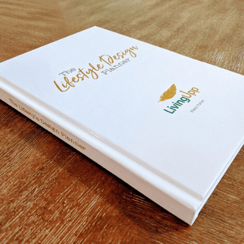I love the stillness of the early morning hours. It’s quiet. It’s unhurried. And it gives me a chance to check in with myself within the pages of my journal before my to-do list commands my full attention.
Over the years, journaling has become a big part of my morning practice. Curled up on the couch with a hot cup of coffee in hand, my mind is free explore new possibilities for the future. But my morning practice has evolved to include more than just journaling. I’ve incorporated a variety of self-care practices, including meditation, yoga, deep breathing, and other strategies that help set the tone for my day.
My morning has changed the way I manage stress, and it’s something that I look forward to each day.
Stress and Your Body
Stress is normal. It’s part of everyday life. Sometimes stress is related to the people you interact with, and sometimes it’s related to situations or circumstances you face throughout the day. Sometimes it comes without warning, and sometimes it brews beneath the surface for months or years.
But stress can take a devastating toll on your body, especially if left unaddressed for long periods of time. When you fail to address the sources of stress in your life, either by ignoring or avoiding them, you could be increasing your health risks. High blood pressure, weight gain (from stress-related or emotional eating), and other chronic medical conditions have been associated with lingering high levels of stress.
Regardless of the source of your stress, your body is designed to handle it. Your internal survival systems enable you to identify and navigate your way through difficult situations.
But how you respond to stress matters, too.
Moving from Chaos to Calm
While it’s clear that managing your stress levels effectively can protect your health, knowing how to tend to your emotional state takes practice, and it requires you to get to know yourself on a much deeper level.
That’s where self-care comes in.
Experimenting with different forms of self-care can help you identify which ones are most effective, and which ones aren’t right for you. Once you know what works and what doesn’t, you can move out of the chaos and back into a state of calm more easily.
Calming Self-Care Strategies
While journaling is an excellent stress reliever, there are many other forms of self-care that can be integrating with your journaling practice to help you manage stress.
Here are a few calming self-care strategies to consider weaving into your journaling practice:
1: Deep Breathing
Deep breathing exercises can be an effective stress management strategy. Not only does deep breathing improve lung function, but it also has a calming effect, by reducing your heart rate, cortisol levels, and blood pressure.
2: Stretching
Taking time to stretch periodically can help relieve tension and muscle tightness. One study that looked at the effectiveness of stretching and deep breathing exercises found a reduction in PTSD-like symptoms.
3: Meditation
Meditation promotes self-awareness. It allows you the time and space to reconnect with your internal guidance system. While there are many different forms of meditation to choose from, research has shown promising results when it comes to reducing stress-related symptoms. Spending just a few minutes each day in meditation can help relieve stress, and can easily be incorporated into your journaling practice.
4: Aromatherapy
Aromatherapy has been found to reduce anxiety and improve sleep quality. Scents such as lavender and eucalyptus are popular essential oils that are often used to boost relaxation. (And you can even use aromatherapy on your journal.)
5: Spending Time in Nature
Nature has a way of putting life into perspective. If you’ve ever stood beneath the towering trees in the Redwood Forest, or gazed up at the vivid green Na Pali coastline on Kauai, then you know what I mean. Spending time in nature has a calming effect on your nervous system, which makes it an effective calming self-care strategy. Try experimenting with nature journaling to invite a sense of calm into your day.
6: Movement
Movement can help with stress-management, too. Physical activity releases “feel good” endorphins that produce a calming effect. Whether you choose simple movements, like walking or yoga, or opt for more vigorous activities, like competitive sports, be sure to choose a form of movement that fits your health goals. And always check with your doctor before making changes to your physical activity routines.
7: Music
Music has been shown to influence mood, and researchers have found that music can reduce both physiological and psychological symptoms related to stress. Pay attention to the way you feel when you listen to different genres of music, and take note of the songs that make you feel calm, so you can return to them whenever you need to recover from a stressful situation.
8: Art
Use your journal as a form of art therapy. Drawing, sketching, and coloring are often recommended by experts to help alleviate stress. And the good news is, you don’t have to be creative. Doodling counts, too!
Journal Prompts
As you begin to experiment with different forms of self-care, reflect on how each strategy makes you feel. This will help you better understand which are best suited for you. Here are a few prompts to explore in your journal:
What makes you feel calm?
Make a list of the self-care activities that feel the most calming. Then, as you discover new activities add them to the list. By keeping a running list of calming self-care activities, you’ll be able to refer back to your list to choose a strategy more easily.
What do you need in order to feel calm?
Where do you spend the most time journaling? What would make the space more calming? For example, how might you decorate it differently? Spend some time thinking about how your environment impacts your mood.
How can you release negative energy?
Explore some healthy ways to release tension and stress, like going for a walk, meditating, or calling a friend. Journal about what makes you feel better when you encounter stressful situations.
Click here for 10 Quick Journaling Power Prompts to Calm Your Mind.
Summary
Incorporating calming self-care strategies into your daily journaling practice can help you manage stress more effectively throughout the day. Experiment with different forms of self-care—like meditation, physical activity, and art therapy—until you find what’s most effective for you. Manage stress in a healthy way can help reduce your health risks, and make it easier to focus your attention on what’s most important.
Information contained in this article is for educational purposes only and should not be interpreted as providing or replacing medical advice, diagnosis, or treatment.

Author bio: STACY FISHER, RDN, LD, CDCES is the founder of LivingUpp™, a lifestyle design company that teaches women how to use a self-care planning  system to create more ease and better health. She is a registered dietitian and lifestyle coach with 20+ years of experience in the healthcare industry, where she’s worked with large companies such as Dell, Boeing and Nike. Stacy is the author of Go: One Woman. One Van. A New Beginning and The Lifestyle Design Planner, a flexible life organizer for high-achievers who value self-care and simplicity.
system to create more ease and better health. She is a registered dietitian and lifestyle coach with 20+ years of experience in the healthcare industry, where she’s worked with large companies such as Dell, Boeing and Nike. Stacy is the author of Go: One Woman. One Van. A New Beginning and The Lifestyle Design Planner, a flexible life organizer for high-achievers who value self-care and simplicity.



Leave Comment